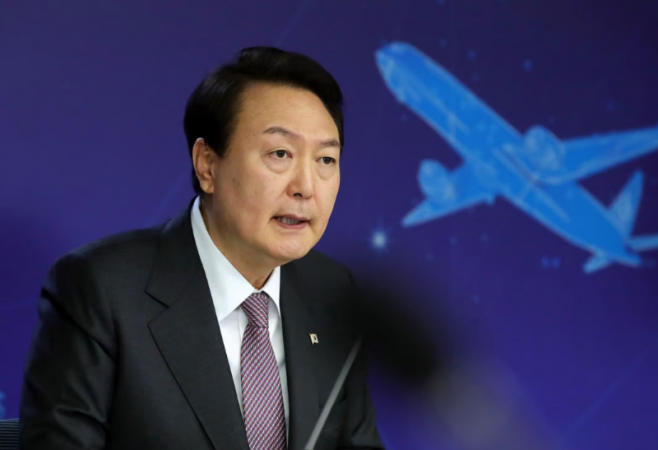
Beijing: As part of a larger plan to reduce the country's trade deficit, the South Korean government is implementing measures to reduce the private sector's reliance on Chinese supply chains while strengthening Southeast Asian options.
In October, South Korea experienced its seventh straight month of a trade deficit, and for the first time since the two countries established diplomatic relations in 1992, the country had a negative trade balance with its largest trading partner, China, for two full quarters. Remaining ,
South Korean President Yoon Suk-yeol hosted a meeting on trade strategy on Wednesday, which was attended by important government officials and business executives.
Also Read: Report: Samsung Mainly Provided OLED Displays for the iPhone 14 Series
While a variety of regional policies were discussed, Yoon emphasized the government's role in promoting private sector development.
He said, "Despite the government's belief that the private sector should drive economic growth, private businesses cannot be solely relied upon to increase the country's exports. The government needs to proactively and actively must be supported."
Seoul knows that both China and South Korea produce similar products for export. The nation is at the same time becoming more dependent on its larger neighbor for raw materials.
The level of trade dependence on China is very high, so the government seeks to diversify imports and exports. According to Kang Sung-jin, professor of economics at Korea University, similar conversations happened when our trade dependence on the US was high.
Also Read: Launch of the Realme 10 Pro Series in India is scheduled for December 8
Over-reliance on a single country undermines political autonomy and makes it challenging to take a favorable stance in trade disputes, so this diversification aims to reduce risk.
The government intends to reduce dependence on Chinese supply chains and expand the presence of South Korea's high value-added industries on the mainland to address this issue.
The government announced it would roll out an early warning system for critical materials to help stabilize and diversify domestic supply chains and support businesses to stockpile goods from different countries.
Over the next year, South Korea will also set aside an additional $100 million for research and development in the materials, components and machinery industries.
The government's efforts to help Korean businesses expand their supply chains within the Association of Southeast Asian Nations coincide with its push to reduce dependence on China (ASEAN).
The government discussed the need for diversification within the ASEAN region during the meeting on Wednesday, with a special focus on diversifying China's supply chains.
The "Vietnam Plus" strategy, which the government recently unveiled, calls for South Korean businesses to diversify supply chains in ASEAN that are currently highly dependent on Vietnam.
Also Read: Meituan is expected to show financial strength in the third quarter
The government recommended that these be extended to Indonesia and Thailand. The government will assist businesses that want to move from China to another country or return to South Korea.
South Korean businesses in high value-added sectors such as consumer goods, services and eco-friendly enterprises will also receive assistance if they are entering the Chinese market.
They will particularly benefit from assistance from South Korean trade promotion organisations, which are spread across important Chinese cities such as Hangzhou, Shenzhen and Shanghai.